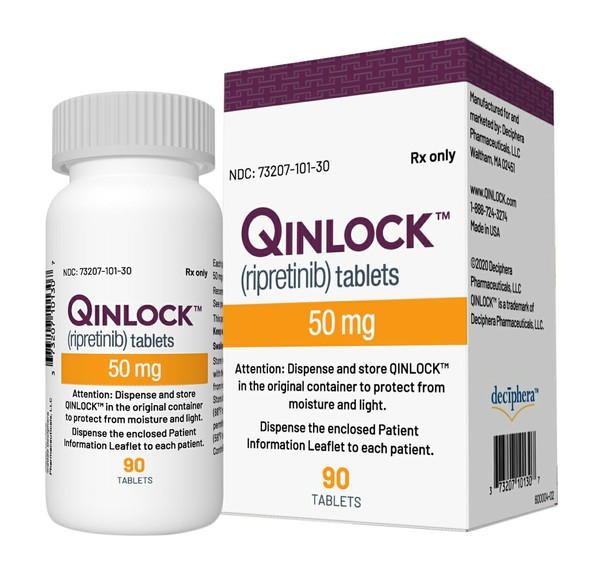Ripretinib (brand name: Qinlock), developed by Deciphera Pharmaceuticals as a treatment for gastrointestinal stromal tumors (GIST), failed to improve progression-free survival (PFS) in advanced GIST patients, compared to sunitinib (brand name: Sutent).
However, ripretinib showed favorable data in adverse reactions such as commonly occurring high blood pressure, hand-foot skin reaction, and neutropenia, and this can make ripretinib a treatment option in clinical care, an expert said.

The American Society of Clinical Oncology (ASCO) held a plenary series session on Tuesday and released the first overall data from the phase 3 INTRIGUE study of ripretinib.
INTRIGUE is a global trial that compared ripretinib with the existing standard of care sunitinib in 453 GIST patients whose treatment failed with imatinib (brand name: Gleevec).
Deciphera Pharmaceuticals had already announced topline results, saying ripretinib failed to meet the primary endpoint in the INTRIGUE trial.
Ripretinib could not prove superiority to sunitinib in PFS, set as the primary endpoint.
According to the ASCO’s overall data pre-released on Jan. 14, the median PFS was eight months in the ripretinib-treated group and 8.3 months in the sunitinib group.
However, in patients with KIT Exon 11 mutation due to imatinib resistance, ripretinib showed numerically better results than sunitinib.
The therapeutic effect against KIT Exon 11 mutation in the second-line treatment of advanced GIST patients is important. Although imatinib is effective against KIT mutation found in about 80 percent of GIST patients, imatinib resistance causes mutations like Exon 11 mutation.
The median PFS in KIT Exon 11 mutation patients was 8.3 months in the ripretinib group and seven months in the sunitinib group. The objective response rate (ORR), set as the secondary endpoint, was 21.7 percent (49 patients) in the ripretinib group and 17.6 percent (40) in the sunitinib group.
However, in KIT Exon 11 mutation patients, ORR was 23.9 percent (39) and 14.6 percent (24), respectively, showing better numerical results in ripretinib.
In the study, ripretinib demonstrated excellent tolerability. The proportion of patients who experienced grade 3 or 4 adverse events was 41.3 percent in the ripretinib group and 65.6 percent in the sunitinib group.
The incidence of grade 3 hypertension was 26.7 percent in the sunitinib group vs. 8.5 percent in the ripretinib group. In addition, the incidence of grade 3 hand-foot skin reaction was 10 percent in the sunitinib group vs. 1.3 percent in the ripretinib group.
Also, fewer patients receiving ripretinib experienced a moderate to extremely large impact on their lives due to skin toxicity than those receiving sunitinib, based on results measured by the dermatology life quality index (DLQI).
Patients receiving ripretinib experienced less deterioration in their ability to engage in either work or leisure activities during treatment.
Dr. Muhammad Shaalan Beg of University of Texas Southwestern Medical Center said although ripretinib did not demonstrate better outcomes than sunitinib in the control of advanced GIST after treatment with imatinib, it had a better safety profile due to lower rates of hypertension, hand-foot skin reaction, and neutropenia.
“The safety profile is one of the important factors when considering treatment options for a patient, so it is important to be aware of these study results,” he said.
Professor Michael Heinrich of Medicine at Oregon Health & Science University, the lead author of the abstract, said, although the INTRIGUE study did not meet its primary endpoint of superiority in PFS versus sunitinib, ripretinib and sunitinib showed similar results.
“Although ripretinib was not superior to sunitinib as a second-line treatment for GIST, it had distinct activity as a fourth-line or subsequent agent, and it remains the only FDA-approved agent in this therapeutic setting,” Heinrich said.
“It is important to provide the detailed results of this study to the oncology community to help physicians make well-informed decisions on the best treatment options for their patients with advanced GIST,” he added.

